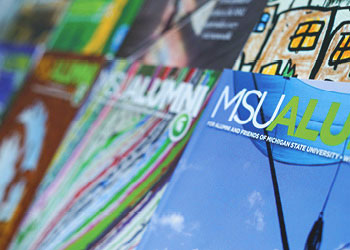Feature: MSU Dubai

A PIONEERING PRESENCE IN THE MIDDLE EAST
MSU’s bold and pioneering debut in the Middle East helps solidify its reputation as an international leader in education.
On November 11, with four selected students singing MSU Shadows, the dedication ceremony for MSU Dubai took place with President Lou Anna K. Simon, MSU Trustees Melanie Foster, Don Nugent and Scott Romney, and Dubai officials and leaders. The ribbon cutting took place at MSU’s new facilities in the Dubai International Academic City (DIAC), a member of TECOM Investments.
It was a bold and pioneering debut in the Middle East for MSU, which launches its presence in this vital region of the world and also solidifies the university’s reputation as an international leader.
Joining MSU officials for the inauguration ceremony were His Excellency Mohammed Al Gergawi, CEO of Dubai Holding, Ayoub Kazim, executive director of DIAC, Abdulla Al Karam, director general of the Knowledge and Human Development Authority, and Amina Al Rustamani, CEO of TECOM Business Parks, as well as other leaders in business, government and education.
“Teaching and research throughout the world are important educational components for building our collective futures in an increasingly interconnected and interdependent world,” says President Lou Anna K. Simon. “Michigan State’s presence in Dubai is a reflection of our world-grant commitment to extend MSU’s knowledge and innovation around the globe and specifically to a region of vital interest to us all.”
The actual opening of MSU Dubai had taken place in August, with 25 undergraduate courses offered to an initial class of more than 40 students, and a faculty that includes many MSU professors. The move was not a sudden decision made to be trendy.
“Given the global and regional stature of Dubai, you might think we just made a decision to come to Dubai,” says John Hudzik, vice president of global engagement and strategic initiatives. “In fact, we decided a long time ago MSU needed to increase its strategic presence in the Middle East. We’ve spent a decade looking for a location and a platform on which to base ourselves while preserving MSU’s core values. Dubai emerged as the best option for instructional reasons, for research reasons, and for connecting with one of the world’s fastest growing economies, with benefits to the state as well.
“We spent a lot of time thinking about this.”
With the first class at MSU Dubai now in place, the university has begun to establish what Provost Kim Wilcox calls the MSU presence in the Middle East.
Wilcox was in Dubai in late August to welcome the undergraduate students that began their academic careers at MSU.
“What we’re doing is creating in Dubai a Michigan State presence,” he said. “It’s the same way we think of Michigan State in East Lansing as more than just classes or more than professors teaching and doing research. It’s a more robust reality. Right now, halfway across the globe, students are taking classes at Michigan State University.”
About a year ago university officials announced that MSU would establish a presence in Dubai, making MSU the first North American university in the Dubai International Academic Center.
“Dubai is one of the leading economic centers of the world, located in the middle of one of the most important regions in the world,” Wilcox says. “Why wouldn’t we want Michigan State, our university, to be a part of that enterprise?”
Brendan Mullan, MSU Dubai’s executive director, says he was proud to see the first class begin. “The MSU Dubai class of 2012 will establish a tradition of leadership excellence and civic engagement in Dubai and beyond,” he says.
Mullan adds that MSU’s presence reflects the university’s values of quality, inclusiveness and community involvement. “MSU brings its status as a top research university, its commitment to civic engagement and its tradition of global connectivity to this program,” he notes.
The Dubai International Academic City, located about 30 minutes from the Dubai business district, addresses the enormous demands for higher education in a nation noted for its growing positive regional and world influence. MSU has full academic authority and quality control over courses and programs, and MSU’s regular course, program, degree, admissions and accreditation requirements will be maintained. Diplomas will be standard MSU diplomas.
Initially, MSU is offering bachelor’s and master’s degree programs selected because of the value to Dubai and the wider region while preserving core MSU admission, degree and quality standards.
Examples of degree options at MSU in Dubai include media, communications, public relations, computer engineering, construction management, family studies and business-related programs. The MSU faculty and administrators have consulted extensively with Dubai’s corporate and government leaders to identify relevant academic offerings.
Hudzik believes that one of the fundamental values promoted by MSU Dubai is inclusivity. “Dubai is the principal location in the region where the notion of inclusivity is what drives the business model and economy of Dubai.” He adds that Dubai is following the development model of Singapore and Hong Kong, “only at a faster pace.”
Beyond the educational component of MSU Dubai, there is what Hudzik calls a “capital connection” in play. “It will be very helpful for Michigan’s economy to be connected in Dubai,” he explains. “There is a tremendous investment in capital there, not just in buildings, but also in software, banking, logistics and transportation. There is also a growing investment in human capital. The United Arab Emirates and Dubai get it.”